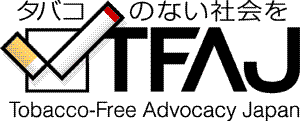 | |
|
TOBACCO-FREE ADVOCACY JAPAN (TFAJ) was formed as a financially independent non-profit organization (NPO) that has the following objectives to: The membership of TFAJ is composed of a multidisciplinary Operating revenues for TFAJ are derived from its membership, charitable donations and any profit from our activities. There is a strict adherence to the philosophical principles of Article 5.3 of the FCTC. The efforts of TFAJ are augmented with cooperation and alliances with other tobacco control organizations and entities outside of Japan. Consequently, TFAJ derives benefit from the emerging knowledge base that realizes effective tobacco “DE-normalization in other parts of the world. Japan ratified the FCTC in 2005 but has not yet to enact any comprehensive tobacco control laws. This is the responsibility of the Ministry of Health, Labor and Welfare (Kōsei-rōdō-shō). There is a tension between the Ministry of Finance (Zaimu-shō) that supports the tobacco industry and the Ministry of Health, Labor and Welfare. Albeit, in spite of the lack of the responsible ministerial support, there are discrete geographic areas that have a range of a smoke-free environments through the efforts of a group physicians and activists. There are over six (6) million premature deaths due to tobacco use and it is estimated that by the end of this century this number could escalate to one (1) billion according to World Health Organization. This needless loss of life requires the “DE normalization” of tobacco from its direct use to the effects of involuntary exposure. According to the health statistics of Japan there are more than one hundred thirty thousand deaths (130,000) directly attributable to smoking and another six thousand eight hundred to involuntary smoke. Jun Sono, M.D. Chairperson |